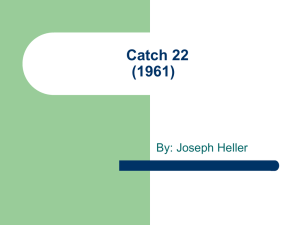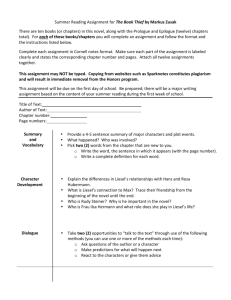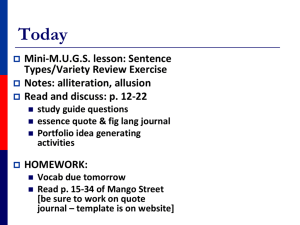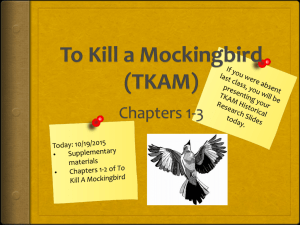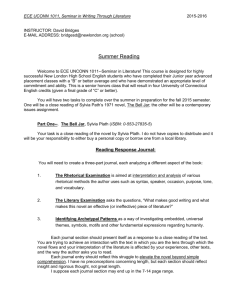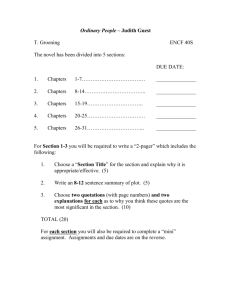File - SEED Presentation of Learning
advertisement
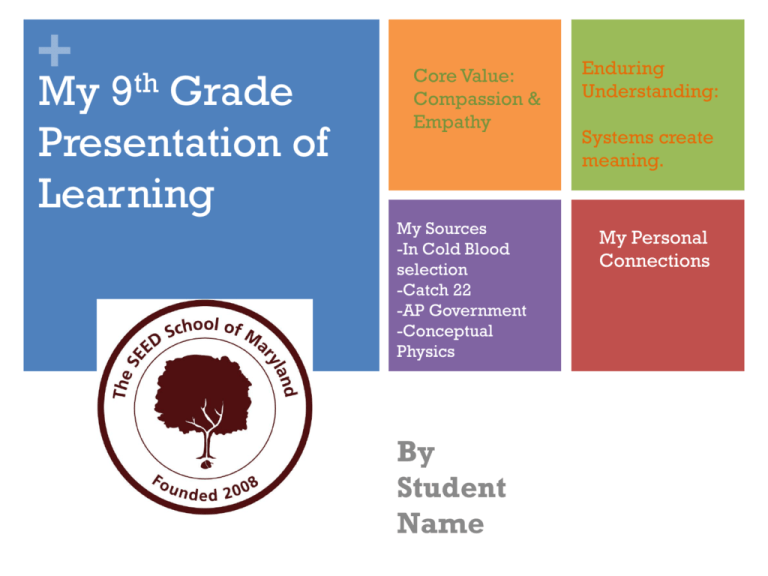
+ My 9th Grade Presentation of Learning Core Value: Compassion & Empathy My Sources -In Cold Blood selection -Catch 22 -AP Government -Conceptual Physics By Student Name Enduring Understanding: Systems create meaning. My Personal Connections + In Cold Blood selection (My ELA Book) Summary: The opening pages of In Cold Blood, create a movie-like image of flying into town, landing, and then driving into the center of town. From a distance, it looks like a quiet, idyllic, small town. As you get closer, you realize that the town is desolate, except for the beautiful school ( Capote, 1966). Main Characters-The town + Catch 22 ( My independent book) Summary-The development of the novel can be split into multiple segments. The first (chapters 1–11) broadly follows the story fragmented between characters, but in a single chronological time in 1943. The second (chapters 12–20) flashes back to focus primarily on the "Great Big Siege of Bologna" before once again jumping to the chronological "present" of 1943 in the third part (chapter 21–25). The fourth (chapters 26–28) flashes back to the origins and growth of Milo's syndicate, with the fifth part (chapter 28–32) returning again to the narrative "present" but keeping to the same tone of the previous four. In the sixth and final part (chapter 32 on) while remaining in the "present" time the novel takes a much darker turn and spends the remaining chapters focusing on the serious and brutal nature of war and life in general. While the previous five parts develop the novel in the present and by use of flash-backs, it is in chapters 32–41 of the sixth and final part where the novel significantly darkens. Previously the reader had been cushioned from experiencing the full horror of events, but now the events are laid bare, allowing the full effect to take place. The horror begins with the attack on the undefended Italian mountain village, with the following chapters involving despair (Doc Daneeka and the Chaplain), disappearance in combat (Orr and Clevinger), disappearance caused by the army (Dunbar) or death (Nately, McWatt, Mudd, Kid Sampson, Dobbs, Chief White Halfoat and Hungry Joe) of most of Yossarian's friends, culminating in the unspeakable horrors of Chapter 39, in particular the rape and murder of Michaela, who represents pure innocence.[4] In Chapter 41, the full details of the gruesome death of Snowden are finally revealed. Despite this, the novel ends on an upbeat note with Yossarian learning of Orr's miraculous escape to Sweden and Yossarian's pledge to follow him there (Heller, 1961) Main Characters- Holden and Yossarian + The Great Gatsby (my independent book) (summary here) (Fitzgerald, 1925). + My AP Government Project (Students debated the pros and cons of a variety of public policy issues. In this space they can insert a video clip, if they recorded the debate, describe the debate, or insert their debate speech. Students need MLA citations if they use other sources in this space.) + My Conceptual Physic’s Project Make a Wind Generator—the student can harness the power of the wind to light her home, or at least a small light bulb. This is a good project for the student interested in alternative energy. What Type of Bridge is the Strongest?—the student can build bridges made of different materials to see what type can hold the most weight. This is a good project for the student interested in engineering. + Core Values in the Text and Projects: Respect & Responsibility In Cold Blood One of the running motifs throughout the book is a general lack of respect for life and responsibility. The two men murder the family in cold blood. The state executes both men for the crime. One of the men refuses to take responsibility for his actions while the other provides vivid details of the murders without remorse (Capote, 1966. Catch 22 Throughout the novel, Heller attempts to escape the absurdities of war by running away. Caught in a catch 22, Heller is unable to show respect or demonstrate responsibility because the foundation of his life situation – war- is unjust (Heller, 1961). + Core Values in the Text and Projects (cont.) Respect & Responsibility AP Government . Students will display respect by listening and acknowledging their components arguments while composing their thoughts into a rebuttal speech. Responsibility will also be displayed by students through researching both sides of the debate topic. Conceptual Physics Physics makes a lot of important contributions to society (e.g., advances in science and technology). Responsibility is at the root of accurate data collection and reporting. Citing other investigators’ work is an example of respect. + Core Values in the Text and Projects (cont.) Respect & Responsibility Geometry (connection to core values goes here) AP English Language and Composition (connection to core values goes here) + Enduring Understanding: Systems create understanding ELA connection By reading closely and looking at the rhetorical triangle, rhetorical devices, and pattern of development, which are systems in ELA, the reader can better understand the author’s purpose and the text’s message. Example 1: In the excerpt from In Cold Blood, by examining the diction, a rhetorical device, the reader begins to understand that things are not as they seem. In Catch 22, by considering the audience, subject, and purpose, the reader begins to understand that this novel explores the conflict between utilitarianism and libertianism. + Enduring Understanding: Systems create understanding (cont.) AP Government Through the examination of various systems of government students will develop an understanding of the current public policy debates and the issues surrounding them. Example 1: Through the exploration of several Supreme Court cases, the evolution of laws in the United States can be gleaned. From this gleaning I can see how the judicial system creates an understanding of the application of the constitution. + Enduring Understanding: Systems create understanding (cont.) Conceptual Physics: Physics (really, science in general) seeks to collect facts and to discern the order that exists between and amongst the various facts. As they collect and analyze facts, students begin to identify, describe, and even develop systems that lead to further understanding. Both the wind power generator and bridge engineering projects capitalize on the collection and analysis of facts and the development of a system. + Enduring Understanding: Systems create understanding (cont.) Geometry Example of EU for geometry goes here + Enduring Understanding: Systems create understanding (cont.) AP English Language and Composition Through the examination of how authors use the systems of writing; such as, rhetorical triangle, rhetorical devices, organizational patterns, students will develop their own system for unlocking the meanings and themes found in literature. + My Personal Connections & Takeaways The student’s personal connections and AHA’s! go here. + My Collection of Evidence The following items are in my folder of documents that demonstrate the core values that I have shown this year (below are examples of possible items of evidence. Writing assignment Art project Science lab Etc. + Thank you for watching…. My 9th Grade Presentation of Learning! A Special Thanks To…. My Teachers My Advisor My Counselor …who made this all possible!
